One of the changes that has attracted the most attention in the new textbooks of the Ministry of Public Education (SEP) is that those intended for subjects such as Spanish, Mathematics and Natural Sciences have disappeared. But this does not mean that these subjects will no longer be taught in public schools, since all that knowledge was condensed in a single book entitled “Our Knowledge”.
Some topics in this regard can also be found in other books called “Multiple Languages”, “Classroom Projects”, “Community Projects” and some others that depend on the degree studied.
In other words, the fact that there is no book dedicated to Natural Sciences, it does not represent eliminating matter as has been said on social networks. What does exist is a significant change in the contents that were usually presented by lessons in books specific to each subject, now in a book there may be mixed content. For example, in “Our Knowledge” students can study geometry and in the following pages start with the components of nature.
For specialists interviewed by this medium, defining what impact this change will bring to learning, as well as to environmental education, will depend on the preparation of teachers, their teaching techniques and the topics addressed in the new SEP books.
“The lack of environmental content continues, but here the crux of the matter is that teachers should also receive preparation courses that allow us to have knowledge of the area in order to venture into a new way of thinking for students,” said Rodrigo Arango, a teacher of basic education and teacher in Climate Change in Mexico City.
However, less than a month after the start of the school year, the books had not been distributed to teachers because district courts stopped printing and distributing them. So far, they are only available for public consultation through the website of the National Commission for Free Textbooks (Conaliteg) belonging to the SEP.
Recently, Leticia Ramírez Amaya, Secretary of Public Education, announced at a press conference from the National Palace that they will be delivered before August 28.
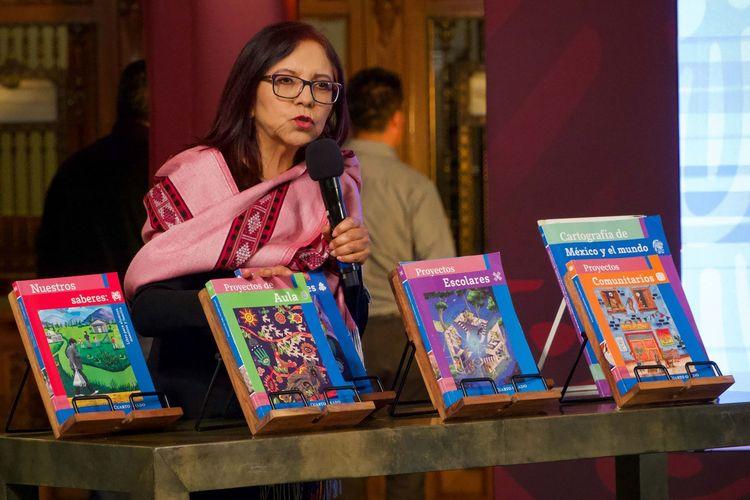
Leticia Ramírez Amaya, Secretary of Public Education, during the presentation of the new books last August. Photo: Rogelio Morales/Cuartoscuro.com
Less content on climate change
In the subject of Natural Sciences, the contents have changed from lessons on knowledge of the human body, ecosystems, biological processes of living beings, the dish of good food and water cycles, to mention some of the main lines of learning, to being divided thematically by concepts related to these topics.
“It's complicated because naturally the child would have to understand by project how he is using mathematics, how far he is looking at the science part and where he is watching the story, to deduce it. Not everything can be globalized, not everything can be articulated in this way,” said Rosalba Paz, elementary school director in Ecatepec, State of Mexico.
An example of the issues that are now shown in a reduced way are those related to climate change. In the book of Natural Sciences for the sixth grade for the 2021-2022 academic year, there were lessons dedicated to the relationship between air pollution and global warming and climate change, as well as the impacts on energy transformation. It consisted of 15 pages with exercises included.
Currently, the new books for the 2023 - 2024 academic year reduced the lessons to short definitions related to climate change that, although they introduce new concepts such as types of pollution or acid rain, in the entire book “Our Knowledge” there are only seven pages dedicated to this learning.
In addition, there are statements such as in the definition of air pollution that exemplify that “air flights are the second largest source of polluting gas emissions to the atmosphere”.
However, the Intergovernmental Panel on Climate Change (IPCC) has indicated in its reports that the main greenhouse gas emissions that come from human activities are attributed to the burning of fossil fuels, deforestation and agriculture. And although transportation in the world is an important factor, it does not fall exclusively to airplanes.
“These topics are very short, although they are of great importance. They should be topics with a language according to the child's level so that they can understand and understand from the different stages of knowledge,” said Professor Rodrigo Arango.
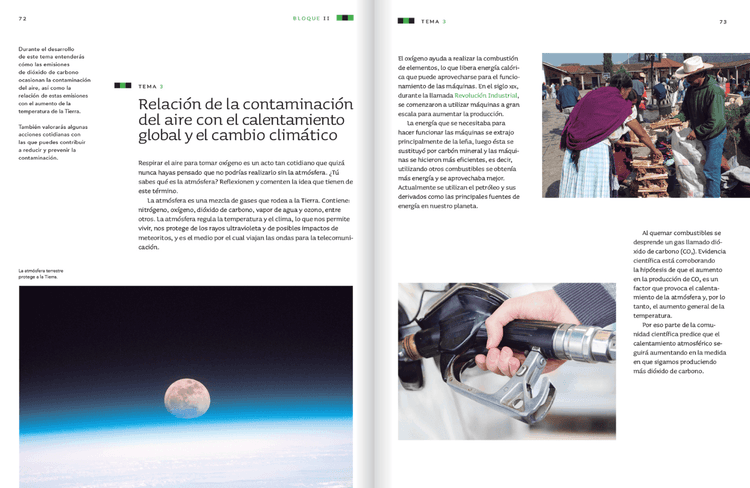
Lesson on global warming in the Natural Sciences book of the 2021 cycle.
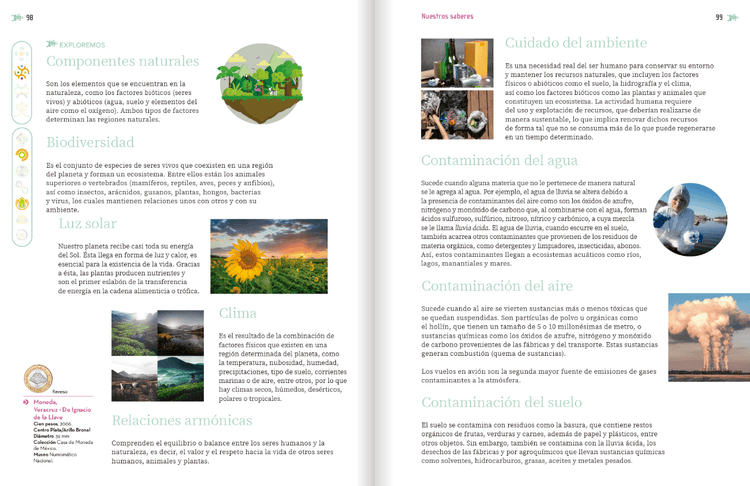
New presentation of the Natural Sciences section in the new books of the SEP cycle 2023 - 2024.
The SEP argues for a change in the educational model
According to both teachers interviewed for this publication, this new condensation of subjects represents a decrease in knowledge in books. However, the SEP has argued that this new educational model called New Mexican School (NEM) has the purpose of articulating learning in only four training areas and giving greater autonomy to educational institutions.
At a press conference on the new books of the SEP on August 14, Ángel Rogelio Díaz-Barriga Casales, an academic at the Institute for Research on University and Education (IIUE) of the National Autonomous University of Mexico (UNAM), said that “today the textbook is not a book of lessons, it is a book that seeks to link with the student's life and to support teaching work”.
“It's supposed to give us teachers freedom to decide how and what we're going to teach. We have to do a community study, a diagnosis, to know what children need to learn and based on this we can decide what they should learn,” said director Rosalba Paz.
Regarding the impact that this may have on extensions of science education, such as environmental education, Professor Arango indicated that the freedom of each teacher may be linked to their profile.
“Environmental education, which practically comes from Natural Sciences, should have as its main element urgent issues that we experience, even if there is a decrease in content. In addition to the fact that the professionalization of the teacher is important. When we lack knowledge, even if they come in the book with a basic language, we need to be three or four times as prepared to be able to bring it closer to children,” he added.
However, obstacles in the distribution of new textbooks have made it impossible for teachers to be clear about how to plan the course. In addition to this, the SEP has not designed workshops to support or monitor new materials.
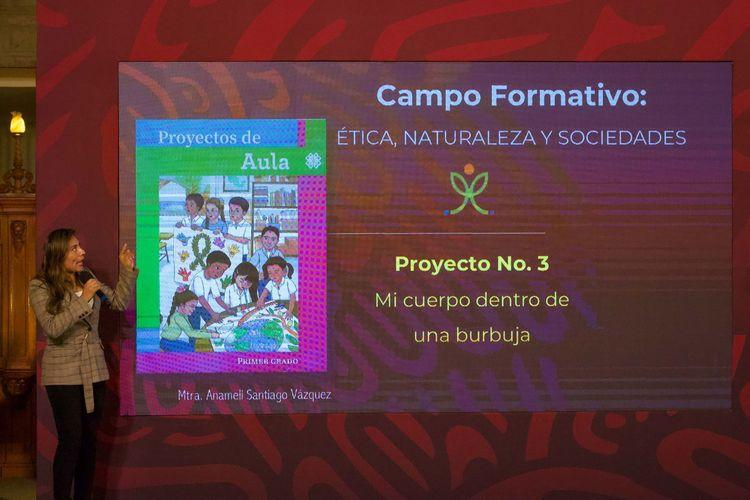
Presentation of the new books last August. Photo: Rogelio Morales/Cuartoscuro.com
Prepare to teach
Teachers from different states of the country have held School Technical Council (CTE) meetings, which serve to make decisions focused on the learning of the course. This time, in the absence of textbooks, they have reviewed the structure of the new materials and see how they could be managed.
“Although the managers (of the CTE) are the directors, there are no specialized personnel who can give the guidelines or guidelines to do a good job and to be able to successfully teach each of the new projects,” explained Professor Arango.
In addition to this, unlike other occasions, the study plans prior to the books were not made.
Since December of last year, Conaliteg had hired companies to print the new books, but this violated the General Education Act, which states in its chapter V that any distribution other than study plans and programs, as well as consultation with parents, teachers and specialized associations, is prohibited.
In addition, the Act states in its article 28 that plans and programs must be published in the Official Gazette of the Federation. And prior to its application, teachers must be trained on its content and methods to facilitate understanding and teaching.
“That's where I think it was a big mistake to edit some textbooks when the teacher hasn't been given a study plan to define what he's going to work on (in the course). There are things that are worthwhile in books, but since there is no plan, books may be disjointed and that teachers today are concerned about how to enter this educational model,” added Director Paz.
Just last August 15, the agreements establishing the Study Plan for Preschool, Primary and Secondary Education were published in the Official Gazette of the Federation.
For their part, the teachers interviewed for this note pointed out that they are not against changes in books, but not having the materials on time, the condensation of subjects in the same book and not having support in their own preparation make it difficult for the transition to be effective. This, in the case of Natural Sciences, will also impact environmental education.
*This content was produced with the support of the Institute for War And Peace Reporting and mentoring from Animal Político, within the framework of the Mexican Journalism Resiliency program.
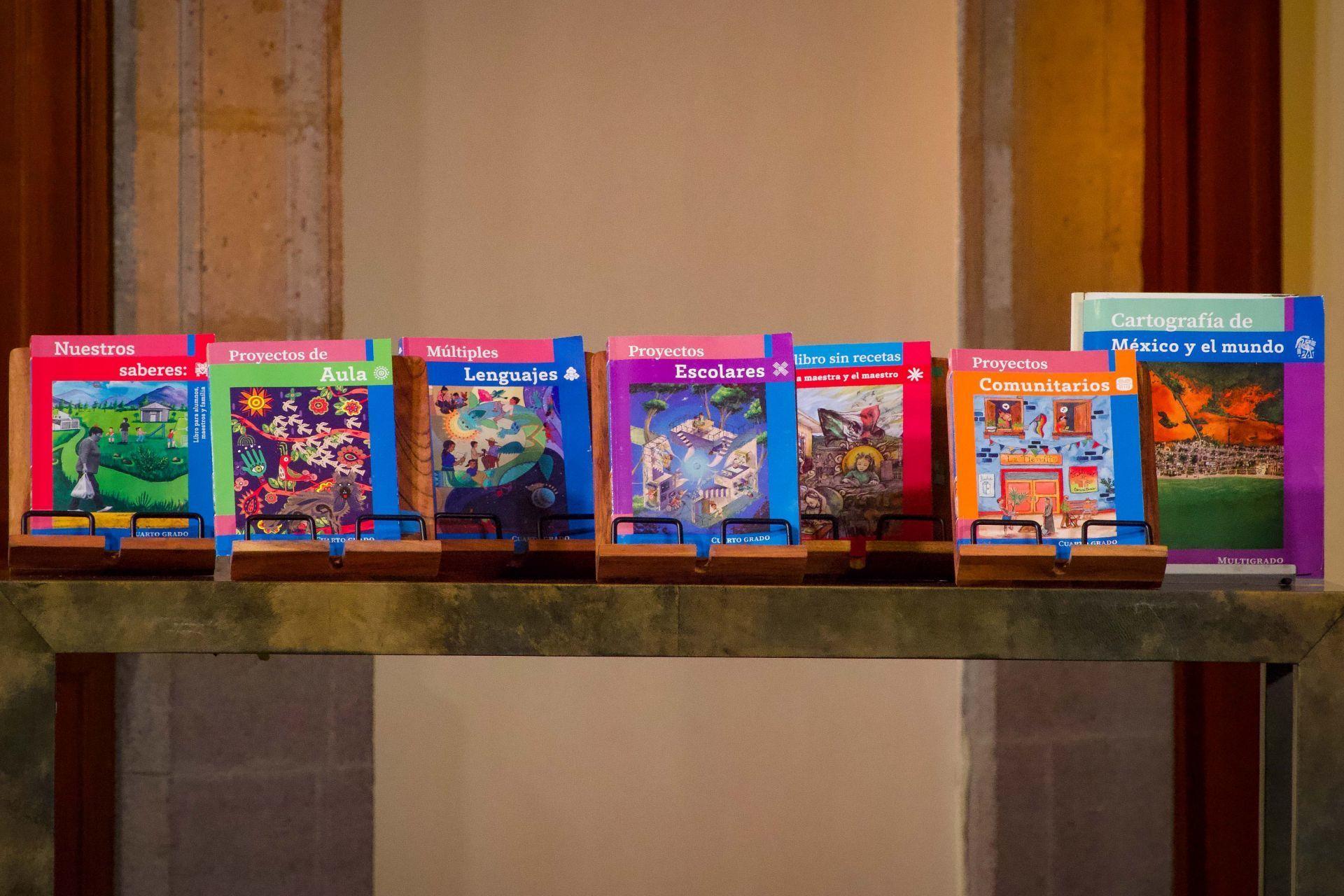


Comentarios (0)